RUT240: Difference between revisions
| Line 39: | Line 39: | ||
External SIM slot let’s you insert or change SIM card with relative ease, and the device will connect to the network right away without any need of reboot. | External SIM slot let’s you insert or change SIM card with relative ease, and the device will connect to the network right away without any need of reboot. | ||
=== | ===Ethernet ports=== | ||
Small and compact device for tight and compact spaces with limited amount of external devices. If one of the ports remains free, it can be used as either main internet connection or a backup connection. | Small and compact device for tight and compact spaces with limited amount of external devices. If one of the ports remains free, it can be used as either main internet connection or a backup connection. | ||
Revision as of 11:47, 11 August 2017
Main Page > EOL Products > RUT240RUT240 is a compact, cost-effective and powerful industrial LTE router for professional applications. Router delivers high performance for mission-critical cellular communication. Equipped with external SIM holder and signal strength status LEDs, it ensures easy network management. External antenna connectors make it possible to attach desired antennas and to easily find the best signal location.
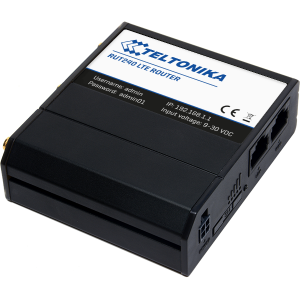
Product features
| Technology | 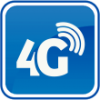
|
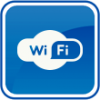
|

|

|

|
| Hardware | 
|

|
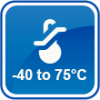
| ||
| Firmware | 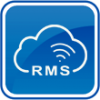
|

|

|
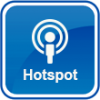
|

|
Description
LTE
Enjoy the LTE internet connection all around whether it is a camping spot, your home or office, with no worries – RUT240 has you covered. This sleek router supports high speed LTE CAT4, which provides speeds of up to 70 Mbps for your leisure or business demands.
Wireless network
With built-in WiFi connectivity you can free yourself from cumbersome Ethernet-based on-site maintenance or simply save some smartphone SIM data for online check-ups and work e-mail attachment downloads.
Input and Output
With configurable inputs you can monitor external events, be it water level threshold crossing or a simple door sensor. Receive alerts remotely either via SMS or e-mail.
External SIM slot
External SIM slot let’s you insert or change SIM card with relative ease, and the device will connect to the network right away without any need of reboot.
Ethernet ports
Small and compact device for tight and compact spaces with limited amount of external devices. If one of the ports remains free, it can be used as either main internet connection or a backup connection.
Android app
Set up your internet connectivity and be ready to go in minutes with just a few clicks from your smartphone. Manage and monitor router’s performance without physically connecting to the device.
RMS support
Manage your routers fleet remotely. With full support of centralized Teltonika Remote Management System you will be able to access, control and monitor all of your routers within a single platform. This will help you make better decisions for future installments and best-use practices. Try RMS for free by clicking this link and registering your free demo account!
Versions
| Product code | Region (operator) | Frequency |
|---|---|---|
| RUT240 00**** (Standard version) |
Europe, the Middle East, Africa, Korea, Thailand, India | FDD-LTE: B1 (2100 MHz)/B3 (1800 MHz)/B5 (850 MHz)/B7 (2600 MHz)/B8 (900 MHz)/B20 (800 MHz) TDD-LTE: B38 (2600 MHz)/B40 (2300 MHz)/B41 (2500 MHz) WCDMA: B1 (2100 MHz)/B5 (850 MHz)/B8 (900 MHz) GSM/EDGE: 900/1800 MHz |
| RUT240 01**** | North America (AT&T, T-mobile) | FDD-LTE: B2 (1900 MHz)/B4 (1700 MHz)/B12 (700 MHz) WCDMA: B2 (1900 MHz)/B4 (1700 MHz)/B5 (850 MHz) |
| RUT240 02**** | North America (Verizon) | FDD-LTE: B4 (1700 MHz)/B13 (700 MHz) |
| RUT240 03**** | Australia (Telstra) | FDD-LTE: B1 (2100 MHz)/B3 (1800 MHz)/B5 (850 MHz)/B7 (2600 MHz)/B28 (700 MHz) WCDMA: B1 (2100 MHz)/B5 (850 MHz) |
| RUT240 04**** | South America, Australia, New Zealand, Taiwan | FDD-LTE: B1 (2100 MHz)/B2 (1900 MHz)/B3 (1800 MHz)/B4 (1700 MHz)/B5 (850 MHz)/B7 (2600 MHz)/B8 (900 MHz)/B28 (700 MHz) TDD-LTE: B40 (2300 MHz) WCDMA: B1 (2100 Mhz)/B2 (1900 Mhz)/B5 (850 Mhz)/B8 (900 MHz) GSM/EDGE: 850/900/1800/1900 MHz |
| RUT240 05**** | Japan | FDD-LTE: B1 (2100 MHz)/B2 (1900 MHz)/B3 (1800 MHz)/B4 (1700 MHz)/B5 (850 MHz)/B7 (2600 MHz)/B8 (900 MHz)/B28 (700 MHz) TDD-LTE: B40 (2300 MHz) WCDMA: B1 (2100 Mhz)/B6 (800 MHz)/B8 (900 MHz)/B19 (800 MHz) |
The price and lead-times for region (operator) specific versions may vary. For more information please contact us.
Technical details
LTE
- LTE FDD: B1/B3/B5/B7/B8/B20
- LTE TDD: B38/B40/B41
- LTE CAT4 up to 70 Mbps DL
- Class 3 (23dBm±2dB) for LTE FDD
- Class 3 (23dBm±2dB) for LTE TDD
UMTS/DC-HSPA+
- 850/900/2100 MHz
- DC-HSPA+ mode: Max 42Mbps (DL) Max 5.76Mbps (UL)
- UMTS mode: 384 kbps DL, 384 kbps UL
- TD-SCDMA: Max 4.2Mbps (DL) Max 2.2Mbps (UL)
- Power Class 3 (24dBm +1/-3dB) for UMTS bands
- Class 3 (24dBm+1/-3dB) for TD-SCDMA
GSM/GPRS/EDGE
- 900/1800 Mhz
- GPRS/EDGE Multi-slot Class 12
- Power Class E2 (27dBm ±3dB) for EDGE 850/900
- Power Class E2 (26dBm +3/-4dB) for EDGE 1800/1900
- Power Class 4 (33dBm ±2dB) for GSM 850/900
- Power Class 1 (30dBm ±2dB) for GSM 1800/1900
Ethernet
- IEEE 802.3, IEEE 802.3u standards
- 1 x LAN 10/100Mbps Ethernet port
- 1 x WAN 10/100Mbps Ethernet port
- Supports auto MDI/MDIX
WiFi
- IEEE 802.11b/g/n WiFi standards
- AP and STA modes
- 64/128-bit WEP, WPA, WPA2, WPA&WPA2 encryption methods
- 2.401-2.495GHz WiFi frequency range
- 20dBm max WiFi TX power
- SSID stealth mode and access control based on MAC address
Downloads
- Flyer nekeisti
- Quick Start Guide nekeisti
- User Manual nekeisti
